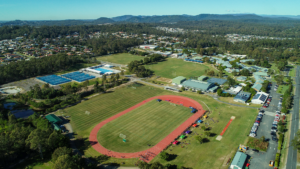QLD Children Return To Campus Next Monday: Here’s What You Need To Know

Here are the Queensland Government Education Department guidelines that Independent Schools Queensland (ISQ) have endorsed this morning – with independent schools still retaining the freedom to implement other protocols on-campus as required…
Reported By ABC News – Education
Children in Queensland won’t need to be regularly tested for COVID-19 when they return to school campus classrooms next Monday 7 February 2021.
That’s one of the main points of the government’s back-to-school plan, which covers the first four weeks of the new school year, from February 7 to March 4.
The plan includes new protocols for wearing masks, and what to do if your child becomes ill. Here’s what you need to know…
Does my child need to wear a mask?
If they’re in Secondary School – then yes they do. Masks are also “strongly encouraged” for children in Junior School Years 3 – 6.
Teachers can remove their masks to teach, and children won’t need to wear one when they’re seated in the classroom.
A limited supply of masks will be available at school for children who don’t have their own.
Do I need to give my child a Rapid Antigen Test?
Not unless they’re showing symptoms.
Unlike New South Wales and Victoria, there’ll be no requirement for parents to regularly test their children.
Regular testing for school children isn’t among the advice issued by the Australian Health Protection Principal Committee (AHPPC) to state and federal governments, Queensland Premier Annastacia Palaszczuk said.
“There is no health advice by the Chief Health Officer or by the AHPPC that school staff or students need regular testing,” she said.
“On top of that, many parents have raised with me concerns about how they would administer these tests to their children.”
“So, I think we’ve reached a good middle point.”
That middle point is that Rapid Antigen Tests will be made available to parents if their children show COVID-19 symptoms – fever, sore throat, heavy coughing, runny nose, shortness of breath, bad headache, heavy fatigue, vomiting or nausea, loss of smell and/or taste, muscle or joint pains, loss of appetite or diarrhoea.
If parents aren’t comfortable administering the test, they can take their child to a State Testing Clinic, where they’ll receive priority treatment so they don’t have to queue.
If children are at home and they need a Rapid Antigen Test, Ms Palaszczuk said one will be provided.
“For example, you might have a friend down the road and they are able to get the test from the school and drop it into your letterbox,” she said.
The State Government estimates that about 750,000 tests will be needed over the first four weeks of school, and it’s confident there will be enough supplies.
What if my child becomes sick at school?
If your child starts showing COVID-19 symptoms at school, they will be isolated until a parent or guardian arrives to collect them.
Their parents or carers will be given a Rapid Antigen Test to administer at home — or they will be able to take their child to a State Testing Clinic.
If the test is negative, the student can return to school.
A positive test will require them to isolate for seven days and follow other guidance from Queensland Health.
If your children show symptoms outside school hours, the message is simple.
“If you are sick, stay at home. Don’t go to school,” Ms Palaszczuk said.
“Any positive cases should be reported to the school itself and Queensland Health.”
Children who are close contacts of positive cases will also need to isolate, in line with the current guidelines.
Independent Education Union Queensland Branch President Mr Terry Burke welcomed the government’s plan, but said there needed to be explicit procedures in place about what to do in the event of a positive COVID-19 case.
“It is critical there are explicit procedures for the notification of a COVID-19 positive contact, how parents will be notified, and, how the impact of such a diagnosis of staff or student/s will be managed,” he said.
“Staff should not be placed in the situation of conducting tests with students.”
Will schools close if there’s an outbreak?
Education Minister Grace Grace said closing schools will be a “last resort”.
She added that there’s no one-size-fits-all policy and any action taken will be in response to the size of the outbreak and its potential impact.
The government said all schools should have access to carbon dioxide monitors to measure ventilation, and if ventilation issues can’t be solved by opening windows or with air conditioning, air purifiers will be provided.
Will access to schools be restricted?
Yes, schools will aim to limit the number of outsiders allowed within school grounds, though there will be some exceptions for vulnerable and very young children.
For example, parents and carers will be allowed to personally walk their children into kindergartens and facilities offering early childhood development programs.
And parents and carers with children in Prep and Year One will be allowed onto school grounds to escort their children to before school play or the classroom.
“From Year Two upwards, we are asking parents to please acknowledge what the school puts in place around drop-off and pick-up zones, and limit your presence on school sites for the first four weeks,” Ms Grace said.
For the next four weeks, school camps, excursions, assemblies and other large gatherings will be cancelled or postponed.
What if teachers get sick?
In Queensland, all teachers, staff and volunteers in private and state schools must be fully vaccinated.
Ms Grace said the current vaccination rate among teachers is 98%.
The Education Department has a “very comprehensive staff management plan in place”, she added.
For example, she said 5,000 fully vaccinated relief staff were on-call to fill gaps where needed.
Mr Burke says it’s important teachers have access to remote work – especially for the medically vulnerable – as well as wage security and access to paid pandemic leave, as well as risk assessment for school activities.
What do I need to do in the next week?
There’s no directive that children must be vaccinated to attend school.
However, health authorities are urging parents of children aged 5 – 11, to get their first dose before they return to the classroom.
Queensland Health Minister Yvette D’Ath also wants more children aged 12 – 15 to get their second dose.
As of Sunday 30 January, only 67.21% of children in that age group were fully vaccinated.
“If your 12- to 15-year-old is concerned about getting this vaccination, take them to a local pharmacy, or to a GP to have that conversation, or go into any one of our vaccination clinics and talk to the staff there,” she said.
“They can explain any concerns, any queries that our 12- to 15-year-olds may have, as to why they might hesitate in getting that vaccine.”

